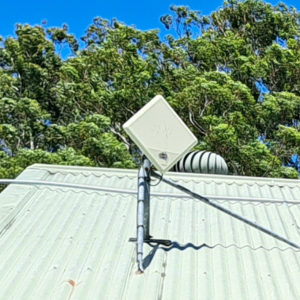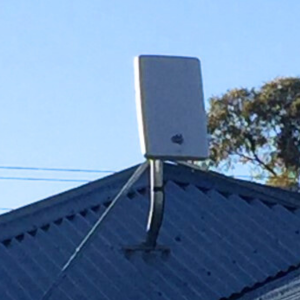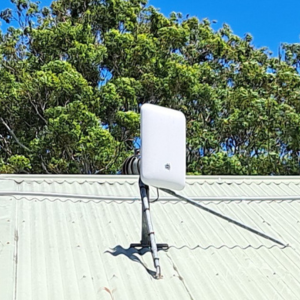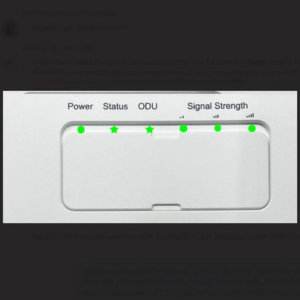Boosting speeds for Fixed Wireless customers
5-minute read
Discover how we’re enhancing the reach and speed of nbn’s Fixed Wireless network to benefit customers across the nation.
Over the last 18 months, we have been deploying the latest cutting-edge technology as part of our rollout of next generation upgrades that will enhance the reach and the speed of the nbn® Fixed Wireless network.
Boosting nbn Fixed Wireless Plus
In November last year, we also announced plans to significantly boost the speed of the existing Fixed Wireless Plus wholesale plan – our most popular plan – without lifting the wholesale price.
This means that we intend to boost the speeds for existing Fixed Wireless services connected to 248,000 homes and businesses to wholesale speeds of up to 100/20 Mbps#^, which is a significant increase to the peak wholesale speeds offered on Fixed Wireless Plus of up to 75/10 Mbps.
In January of this year, we launched a national pilot to introduce the required network changes that will help deliver these higher speeds for our Fixed Wireless Plus customers. We have now completed all the prerequisite network changes, which means our retail providers can now implement their changes to enable this uplift for their customers, across Australia.
As a part of that trial, we are also implementing an uncommitted overprovisioning boost of up to 50 per cent on both the uplink and the downlink, which means even more speed may be available than the advertised maximums, depending on network conditions and equipment.^
We are extremely pleased with the progress of the pilot so far. Our extensive network testing data shows that, for the retailers that have implemented these changes, Fixed Wireless Plus customers have seen an uplift to both the average and peak download speeds. For premises that have newer nbn Wireless Network Terminating Devices (WNTD versions 3 and 4) installed, busy period average speed tests have lifted from around 60-70 Mbps up to about 80-90 Mbps, and peak wholesale rate speed tests are now reaching 100 Mbps and above.#^
"We are extremely pleased with the progress of the pilot so far. Our extensive network testing data shows that, for the retailers that have implemented these changes, Fixed Wireless Plus customers have seen an uplift to both the average and peak download speeds."
For those Fixed Wireless Plus users with our older WTND devices (WNTD version 1 and 2), the uplift is much less. We are currently working with retail providers to offer equipment upgrades for customers having either a WNTD version 1 or 2 at their premises (at no cost to the retail provider). Replacing these older WNTDs is not only good for the individual customer, but also provides a community benefit by helping to improve the performance of the network for neighbouring customers.
We are working with retailers to complete these antenna upgrades as soon as possible and encourage customers to look out for information. More details on the different WNTD types, along with some helpful information related to the indoor LED signal strength indicators, are set out below.
If the current pilot is successful, we intend to introduce the changes formally by mid-2024.
Higher speed tiers on the way
The enhancement of our Fixed Wireless Plus wholesale plan is not the only thing we are planning when it comes to delivering faster nbn speeds across the nbn Fixed Wireless network.
By mid-2024, we intend to launch two new high-speed plans that aim to offer even faster nbn speeds. They are Fixed Wireless Home Fast, which will aim to deliver potential peak wholesale speeds of 200-250/8-20 Mbps#^, and Fixed Wireless Superfast, which will aim to deliver potential peak wholesale speeds of 400/10-40 Mbps#^ across the majority of the enhanced nbn Fixed Wireless network footprint.#^
These new tiers will require the newer WNTD versions to support these higher speeds so we will automatically upgrade our device if it’s necessary to activate the new High Speed Tier product you order from your phone and internet provider.
Again, just like with the boost to Fixed Wireless Plus we are also implementing an uncommitted overprovisioning boost of up to 50 per cent for both these new plans, which means speeds faster than the advertised maximums may be available at times, depending on network conditions and equipment.#^
Progress of overall network upgrade program
The Fixed Wireless Upgrade Program will see all 2,362 nbn Fixed Wireless towers receive a physical upgrade.
We are approaching the halfway point in terms of the physical works being undertaken and we have also completed remote optimisations on most of the remaining towers. To gauge the impact of these works and improvements they are delivering across the network, we have been undertaking extensive network testing.
There is clear evidence, especially once the full upgrades are completed, that we are delivering a step change in the potential network performance. We intend to provide an update on the test data in the coming months.
So, why are we making these changes? The answer is simple: we want to provide Australians with the best possible internet experience on the nbn Fixed Wireless network.
We know that customers are demanding more data, and they are increasingly more reliant on our network for work, education, entertainment and social connection. That's why we are committed to investing in our Fixed Wireless network to help deliver faster and more reliable speeds.#^
Identify what equipment you have

Wireless Network Terminating Device (WNTD) Version 2
The diamond-shaped antenna, these older devices continue to operate reliably and can deliver the potential maximum speeds on the existing 12/1 Mbps and 25/5 Mbps plans, however they are unable to take full advantage of the uplift we have announced for the Fixed Wireless Plus plan (up to 100/20 Mbps).
They are also unable to support the new high-speed tiers and will be automatically upgraded if a high-speed service is ordered through your phone and internet provider.
Please note: WNTD Version 1 – there are only around 1,000 active on the nbn Fixed Wireless network. They look similar and are the same shape as a WNTD Version 2.

WNTD Version 3
The rectangular WNTD with sharper edges. This unit was introduced by nbn in 2018 and is the most widely deployed model on the nbn Fixed Wireless network today.
It can reach potential speeds of 250 Mbps downlink and 25 Mbps uplink, and is therefore suitable for all products apart from the fastest planned new high-speed plan – Fixed Wireless Superfast with potential peak speeds of 400/40 Mbps.
This unit will be upgraded automatically if a Fixed Wireless Superfast service is available at your location and that product is ordered through your phone and internet provider.

WNTD Version 4
The rectangular WNTD model with rounded edges. This unit was introduced in late 2023 and is suitable for all existing and planned Fixed Wireless plans.
In fact, it can reach potential peak speeds well beyond our current planned product offering.
This unit will be installed for most new Fixed Wireless connections and, in most instances, where we are upgrading one of the older Version 1 or Version 2 devices.

Indoor Unit LEDs
You may be curious to know how to interpret the three LEDs labelled 'Signal Strength' on your indoor unit.
There are three LED combinations (1 red, 2 amber or 3 green LEDs). If you are seeing the single red LED, it means your device has a lower signal to noise (SNR) ratio. This may be due to a weak signal, but might also indicate some sort of interference degrading your signal.
We try to keep SNR high and it may be possible to improve this if your service is not working as you expect. Two amber LEDs means you have good signal level and should be getting good service. Three green LEDs means excellent signal quality, able to support our high speed tier plans.
# These are nbn wholesale speed tiers, which nbn provides to retail phone and internet providers. Attainable wholesale speeds are subject to the rollout of network upgrades and some premises will require nbn to complete upgrades to the equipment at the premises.
^ Your experience, including the speeds actually achieved over the nbn network, depends on the nbn network technology and configuration over which services are delivered to your premises, whether you are using the internet during the busy period, and some factors outside our control (like your equipment quality, software, broadband plans, signal reception and how your service provider designs its network). Speeds may be impacted by the number of concurrent users on nbn’s Fixed Wireless network, including during busy periods.



